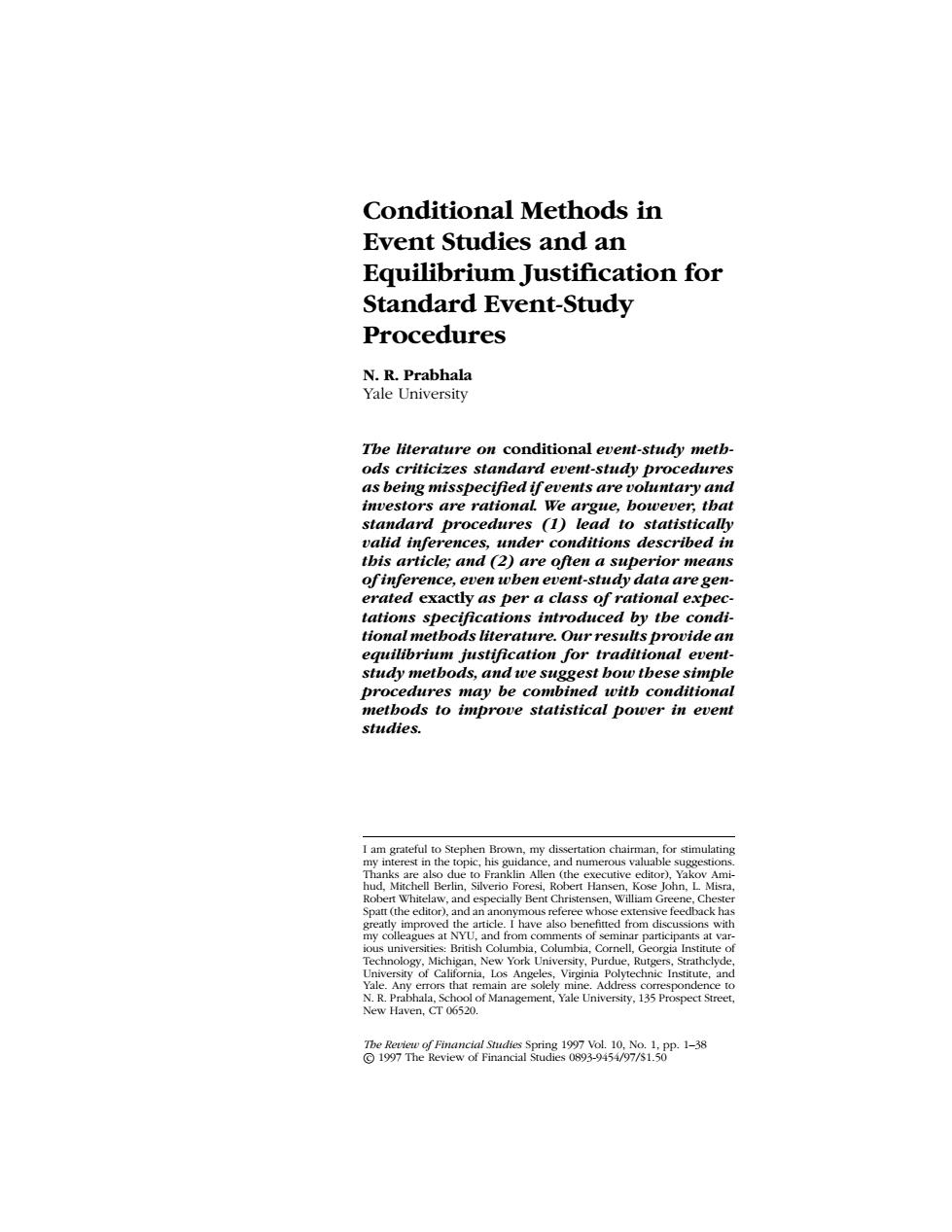正在加载图片...

Conditional Methods in Event Studies and an Equilibrium Justification for Standard Event-Study Procedures N.R.Prabhala Yale University The literature on conditional event-study metb- ods criticizes standard event-study procedures as being misspecified ifevents are voluntary and investors are rational.We argue,bowever,tbat standard procedures (1)lead to statistically valid inferences,under conditions described in this article;and (2)are often a superior means ofinference,even wben event-study data are gen- erated exactly as per a class of rational expec- tations specifications introduced by the condi- tional metbods literature.Our results provide an equilibrium justification for traditional event- study metbods,and we suggest bow tbese simple procedures may be combined witb conditional metbods to improve statistical power in event studies. I am grateful to Stephen Brown,my dissertation chairman,for stimulating my interest in the topic,his guidance,and numerous valuable suggestions. Thanks are also due to Franklin Allen (the executive editor),Yakov Ami- hud,Mitchell Berlin,Silverio Foresi,Robert Hansen,Kose John,L.Misra Robert Whitelaw,and especially Bent Christensen,William Greene,Chester Spatt (the editor),and an anonymous referee whose extensive feedback has greatly improved the article.I have also benefitted from discussions with my colleagues at NYU,and from comments of seminar participants at var- ious universities:British Columbia,Columbia,Cornell,Georgia Institute of Technology,Michigan,New York University,Purdue,Rutgers,Strathclyde, Universiry of California,Los Angeles,Virginia Polytechnic Institute,and Yale.Any errors that remain are solely mine.Address correspondence to N.R.Prabhala,School of Management,Yale University,135 Prospect Street, New Haven,CT 06520. The Review of Financial Studies Spring 1997 Vol.10.No.1,pp.1-38 C 1997 The Review of Financial Studies 0893-9454/97/$1.50Conditional Methods in Event Studies and an Equilibrium Justification for Standard Event-Study Procedures N. R. Prabhala Yale University The literature on conditional event-study methods criticizes standard event-study procedures as being misspecified if events are voluntary and investors are rational. We argue, however, that standard procedures (1) lead to statistically valid inferences, under conditions described in this article; and (2) are often a superior means of inference, even when event-study data are generated exactly as per a class of rational expectations specifications introduced by the conditional methods literature. Our results provide an equilibrium justification for traditional eventstudy methods, and we suggest how these simple procedures may be combined with conditional methods to improve statistical power in event studies. I am grateful to Stephen Brown, my dissertation chairman, for stimulating my interest in the topic, his guidance, and numerous valuable suggestions. Thanks are also due to Franklin Allen (the executive editor), Yakov Amihud, Mitchell Berlin, Silverio Foresi, Robert Hansen, Kose John, L. Misra, Robert Whitelaw, and especially Bent Christensen, William Greene, Chester Spatt (the editor), and an anonymous referee whose extensive feedback has greatly improved the article. I have also benefitted from discussions with my colleagues at NYU, and from comments of seminar participants at various universities: British Columbia, Columbia, Cornell, Georgia Institute of Technology, Michigan, New York University, Purdue, Rutgers, Strathclyde, University of California, Los Angeles, Virginia Polytechnic Institute, and Yale. Any errors that remain are solely mine. Address correspondence to N. R. Prabhala, School of Management, Yale University, 135 Prospect Street, New Haven, CT 06520. The Review of Financial Studies Spring 1997 Vol. 10, No. 1, pp. 1–38 °c 1997 The Review of Financial Studies 0893-9454/97/$1.50